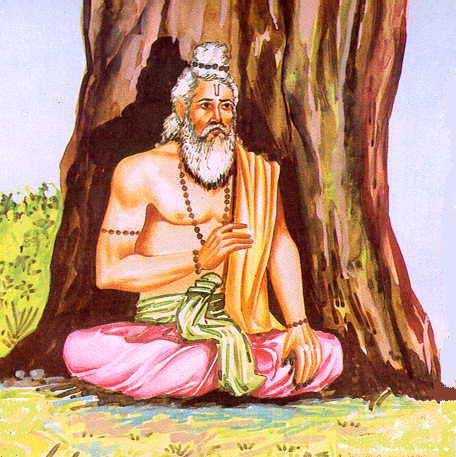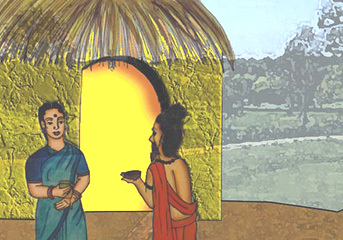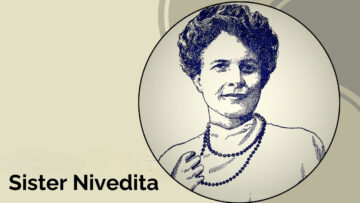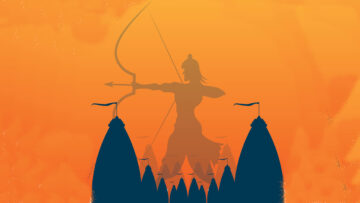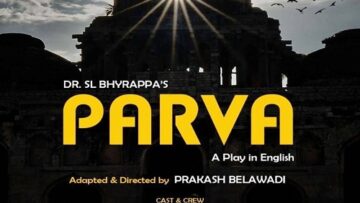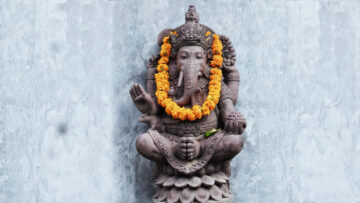The episode of Dharma-Vyaadha in Vanaparva is one of those very famous stories from Mahabharata. It is Markandeya, again, who narrates this episode to Yudhishthira. Through a myriad story, Markandeya presents an astonishing variety of perspectives covering multiple dimensions of life and immense balance.
It is interesting to note that some of these are narrated after the story of the Great Deluge. After a greatly elevating perspective, Markandeya brings Yudhishthira to the ground gradually and presents a series of narratives that are outside the realm of usual experiences. Blessed is the Indian tradition where Leaders have access to such perspectives – if only they are willing to access their heritage.
In the ancient times, there was a Brahmana Koushika (It is interesting why this Brahmana has to be a Koushika). He was greatly filled with a fascination and urge to do Tapasya. He left his house in this pursuit and the study of the Vedas. He was single-minded in his pursuit. He established himself in solitude and began performing his study and penance.
Soon, he came to be known as a Tapasvi, Vedaadhyaayi, and righteous brahmana with special powers and was much respected. He was proficient in the Vedas and the Upanishads. One day, he was in his deep study and penance sitting under a tree.
A stork sitting right above him on the tree dropped its waste which fell on his head. The brahmana was furious. He was filled with rage and an urge in his mind to inflict retribution onto the hapless bird. Being subjected to the angry gaze of the brahmana, the bird was burnt at once, fell, and dropped itself dead.
The Brahmana’s heart was now filled with pity. He regretted that he was overcome with rage and thought of harming a creature. He deeply repented his actions that as a brahmana he lent himself to emotions and hatred. After a while, he entered the village for his daily bhiksha. He often visited different houses for bhiksha.
In one such house, he called upon the Lady of the house and chanted “Bhavati Bhikshaandehi”. The Lady responded at once and asked him to wait while she prepared the bhiksha. At the same time, her husband returned.
The Lady was an exemplary house-holder and one who knew her priorities clearly. She was of righteous conduct and adept in all matters of the family. She was an integral part of all righteous performances of her husband. She performed all ‘Kaaryaas’ that invoked and satisfied the Devatas. She was never found wanting in attending to the frequent guests.
She was a dear mother to the servants of the house, one who addressed their needs at the right time. She never ill-treated them. Beyond everything, she was a caring daughter in law to her aged parents-in-law. Naturally, she shifted her attention. She prepared her husband’s meal, waited till he finished and returned to his other daily performances.
Towards the end of his return, she saw the brahmana standing at the door yet. He regretted that she forgot to offer him his bhiksha, prepared it at once, and offered it to him with greater concern than usual.
Koushika, though, was in rage again. With a single glance, the Lady understood that the brahmana was filled with anger. He questioned her unusual delay. The Lady gently sought “Oh great scholar, you must forgive my deviance. I deserve to be forgiven and you are obliged to.
Just as I prepared your bhiksha my husband came back tired from his usual work. It was my primary duty to attend to him”. Hearing this, Koushika gave himself to his rage. “Oh Lady, does that mean that learned Brahmanas are not more important?
Is your husband more important for you than a brahmana seeking Bhiksha? Have you even understood the dharma of a Grihini? You must know that even the Devendra – the lord of all Devas, first honors the brahmana and then performs his other duties. You may have not served elders enough and hence you may have not learned your important duties. Know that Brahmanas are like Agni and can burn the entire earth into ashes – leave alone you”.
The Lady smiled. “Oh great brahmana, your anger can do nothing to me. Do you think I am that hapless stork? Your cruel gaze has no effect on me. I have never dishonored a brahmana. My delay today was inadvertent and unintended. My mistake is worthy of your forgiveness. But know that I consider attending to my householder duties as of paramount importance, which I perform meticulously and with shraddha, every single day.
As a result, your rage can do nothing to me. You are yet to understand the great secrets behind Tapasya and Adhyayana that you are performing, thereby the subtle aspects of Dharma. Please note that anger alone can completely destroy you”. She continued with a description of who a Brahmana is.
“Brahmana is that person who has absolutely won over his anger according to the Devas. Brahmanas are harsh on the cruel and unrighteous. But they are very gentle with the righteous and are full of forgiveness. Know that taking care of my home, family, and husband is of paramount importance to me. Know that I learned of your burning of that Stork by the Tapasya of my daily performances alone”.
The Lady had already brought Koushika down to the earth. She too had calmed down and continued “Oh Brahmana, please know that Anger kills one from within. It does not behoove of a true Brahmana to give into anger. Brahmana is one who does not hurt others, one who has won over one’s anger. He is a Brahmana who is truthful, respectful of the learned, with absolute control over senses, pleasure, and anger.
A Brahmana is pure within and outside, thinks of others in the same measure as self, firm in mind, and performs all righteous duties prescribed by the Dharma. A Brahmana is a continuous adhyayana, yagna for self and others. A Brahmana always gives and is in the thought of Parabrahma all the time.”
The Lady had already put Koushika to repentance. But she was not done with yet. “Oh, Brahmana, through your adhyayana you have acquired the knowledge of Dharma in many dimensions but you are yet to acquire the knowledge of the subtle nature of Dharma. Dharma is Sookshma”. This struck Koushika in the right place. His spine shook.
The Lady then urged upon him to visit the city of Mithila and meet the respected Dharma Vyaadha (a butcher known for his Dharma) to learn subtle aspects of Dharma from him. She then sought forgiveness that she spoke this much to a Brahmana performing penance and in deep study of the Vedas. With this the transformation of Koushika was complete.
Koushika was filled with shame and was in a deep stun. “Oh Lady, I am pleased with you. Let you be blessed all that is good. Your calm words full of wisdom has completely melted my anger. I am sure your gentle words of the objection shall lead to my great good in the future. I shall visit Dharma-Vyaadha, as you said”.
Koushika then repeatedly cursed himself for his act of excess and walked towards his Ashrama. He continued to perform his duties but the Lady’s words rang in his ears and only grew loud with time. With each passing moment, he cursed himself for his conduct, and the urge to visit Dharma-Vyaadha increased. In one moment, the urge grew into action and Koushika began to walk towards the city of Mithila, that great kingdom of Janaka Maharaja, to find that Dharma-Vyaadha and learn about the subtle nature of Dharma.
This is one story that all aspirants of knowledge and exalted worlds must always keep in mind. It is remarkable that Koushika not only assumes anger at the drop of waste from a Stork. Fundamentally, the Stork did no adharma. It is in its nature to drop its waste sitting on a tree.
It is Koushika who has stretched out from his place into its territory. Yet, it is not the stork that is amused but Koushika who is filled with rage. It is this subtle dharma that Koushika fails to appreciate. He does so because he is filled with an egoistic urge to acquire knowledge of the Vedas.
It is a result of inadequate appreciation of the purpose of Adhyayana. This is part of his own Sadhana. He has to go through this experience to appreciate the real purpose of the Vedas. Just as Koushika Vishwamitra went through a roller-coaster before becoming a Brahmarshi.
Koushika is indeed a metaphor for such a tumultuous transformation. Knowledge when not contained in the right container always results in the development of the ego. That container is nothing but the heart. Daya is the root of Dharma. Nevertheless, suffice to say that any acquisition of knowledge does concentrate enough power. An intention to cause harm will indeed result in the same – the hapless are more vulnerable. The story resounds this warning in unmistakable terms.
What happens at the door-step of the Lady is the next step in his journey towards complete knowledge. His very recent experience has not resulted in a complete transformation yet. He once again gives in to anger for exactly the same reason. He can only see the deviance of the lady with respect to his need. He fails to appreciate the priority that her house-hold responsibilities assume as part of the same Dharma.
The Lady has seen many practicing Brahmanas. Naturally, she must have developed the ability to grasp the difference between knowledge resulting in arrogance from the one containing wisdom and meaningful action.
However, the biggest metaphor lies within the source of her coming to know that the Brahmana has burnt a stork with his anger, which she never witnessed in person. By the virtue of her Tapasya of performing household duties, she has acquired the ability to recognize the arrogance that exclusively comes from Knowledge.
Being able to run the affairs of a house which is a near community requires immense knowledge, empathy, love, righteousness, toughness when required, and so on. That experience develops discretion and distinguishing abilities in a person.
Once she recognizes that the Brahmana is brimming with the arrogance of knowledge it is clear to her a stork somewhere merely performing its natural Dharma must have been a victim. Her Tapasya in the house-hold is greater because that has brought in her the wisdom of the Vedas and their application to nurture an ecosystem as opposed to that Koushika which at this stage has not matured into purposeful action for the society.
This is where tradition places the purpose of Vedas. Ultimately, life is anchored in the house-hold. All knowledge must eventually come back and elevate the house-hold. All knowledge must know where to bow one’s head, what deserves empathy, and how knowledge must be applied. It is knowledge and the righteous application of knowledge that amounts to the real Vidya.
Pandavas were constantly guided to make this distinction. In the next part, we shall see what happens when Koushika visits Dharma-Vyaadha.
Disclaimer: The opinions expressed in this article belong to the author. Indic Today is neither responsible nor liable for the accuracy, completeness, suitability, or validity of any information in the article.


